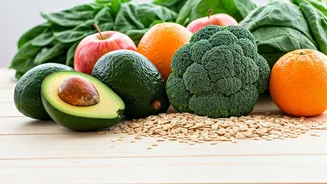Oats and Oatmeal
Oats and oatmeal are renowned for their cholesterol-lowering prowess. They are rich in soluble fiber, which forms a gel-like substance that traps cholesterol in the digestive
system, preventing its absorption into the bloodstream. Just a daily serving of 1.5 cups of cooked oatmeal can lower total cholesterol by 5% to 8%. Moreover, the soluble fiber in oats also helps regulate blood sugar levels, contributing to overall cardiovascular health. Incorporating oats into your diet is simple; enjoy oatmeal for breakfast, add oats to smoothies, or use oat flour in baking. Their versatility makes them an excellent choice for a heart-healthy lifestyle. The key is to consume them regularly to reap the benefits.
Beans' Heart Benefits
Beans, including kidney beans, navy beans, and lentils, are packed with soluble fiber, making them effective cholesterol fighters. They offer several advantages, including reducing LDL (bad) cholesterol levels. In addition, beans are a great source of plant-based protein, which can help lower the risk of heart disease. Incorporating beans into your diet is straightforward, as they can be added to soups, stews, salads, or served as a side dish. The high fiber content in beans also promotes satiety, which can assist in weight management, indirectly supporting heart health. Consuming at least one cup of beans daily can make a notable difference in your cholesterol profile. They are a cost-effective and nutritious addition to any diet.
Fatty Fish's Impact
Fatty fish, such as salmon, tuna, mackerel, and sardines, are rich in omega-3 fatty acids, which significantly benefit heart health. Omega-3s help lower triglycerides, reduce blood pressure, and decrease the risk of blood clots. Eating two servings of fatty fish per week can lower triglycerides and improve overall cardiovascular function. Omega-3s also reduce inflammation, which plays a crucial role in preventing heart disease. Preparing fatty fish is simple; it can be grilled, baked, or pan-fried. Consuming these types of fish regularly is a delicious and effective way to support your heart health. They offer a flavorful and nutrient-dense addition to any balanced diet.
Nuts' Heart Health
Nuts, particularly almonds, walnuts, and cashews, contain healthy fats, fiber, and plant sterols, which are all beneficial for heart health. They help lower LDL cholesterol and can reduce the risk of heart disease. A handful of nuts per day can make a significant difference in your cholesterol profile. Nuts are a convenient snack and can be added to salads, oatmeal, or yogurt. However, it’s important to consume nuts in moderation, as they are calorie-dense. Choosing unsalted nuts is also recommended to manage sodium intake. Nuts are a simple and flavorful way to support heart health, contributing to both a healthy diet and lifestyle.
Fruits for Cholesterol
Fruits, especially apples, grapes, strawberries, and citrus fruits, are rich in pectin, a type of soluble fiber that helps lower LDL cholesterol. They also provide essential vitamins and antioxidants that protect against heart disease. The fiber content in fruits helps to bind cholesterol and remove it from the body. Eating fruits daily can contribute to better cholesterol management. Incorporating fruit into your diet is easy; enjoy them as snacks, add them to smoothies, or include them in salads. The natural sweetness and fiber content make fruits a healthy and enjoyable way to support cardiovascular health. They are a vital part of a balanced diet.
Vegetables for Your Heart
Vegetables, especially those high in fiber and nutrients, are beneficial for heart health and can help manage cholesterol levels. Incorporating a variety of vegetables into your diet ensures you get a wide range of vitamins, minerals, and antioxidants. These nutrients help fight inflammation and protect against heart disease. Vegetables such as spinach, kale, and broccoli are particularly beneficial due to their high fiber and nutrient content. Prepare them by steaming, roasting, or adding them to salads and soups. Eating at least five servings of vegetables daily supports healthy cholesterol levels. They are crucial for maintaining a balanced diet.
Plant Sterols/Stanols
Plant sterols and stanols are substances found in plants that can help lower cholesterol by blocking the absorption of cholesterol in the small intestine. They are often added to foods like margarine, yogurt, and orange juice. Consuming foods fortified with plant sterols and stanols can reduce LDL cholesterol levels. The recommended intake of plant sterols and stanols is typically between 1.5 to 3 grams per day. They are an effective tool for people looking to manage their cholesterol levels. Using these fortified foods as part of a balanced diet can support better cardiovascular health. They are most effective when combined with other heart-healthy lifestyle changes.

















